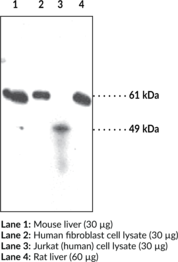Description
Histone H2A is a nuclear protein and a component of the nucleosome core, a basic unit of chromatin, that is essential for organizing genomic DNA in eukaryotic nuclei.{57056} It is a globular protein that contains an unstructured N-terminal tail that extends outside of the nucleosome core and is subject to a variety of post-translational modifications (PTMs), including ubiquitination, acetylation, methylation, and phosphorylation, which function as epigenetic regulators of transcription.{18136,57056} Histone H2A contains a C-terminal tail that, in contrast to other core histones, also extends outside of the nucleosome core and is highly variable, yielding a number of H2A variants that are subject to PTMs and differentially regulate nucleosome stability and chromatin structure.{58069} Serum histone H2A autoantibodies have been found in patients with drug-induced or spontaneous systemic lupus erythematosus (SLE).{58068} Cayman’s Histone H2A (C-Term) Monoclonal Antibody can be used for ELISA, immunocytochemistry (ICC), multiplex-based assay, and Western blot (WB) applications. This antibody recognizes the C-terminal region of histone H2A independent of PTMs.
Synonyms:
Immunogen: Peptide from the C-terminal region of human H2A
Formulation: 100 µg of protein A-affinity purified monoclonal antibody
Isotype: IgG
Applications: ELISA, ICC, multiplex-based assays, WB
Origin:
Stability: 365 days
Application|ELISA||Application|Immunocytochemistry||Application|Multiplex||Application|Western Blot||Product Type|Antibodies|Monoclonal Antibodies||Research Area|Epigenetics, Transcription, & Translation|Histones/Histone Peptides|Unmodified Histones||Research Area|Immunology & Inflammation|Autoimmunity|Lupus




